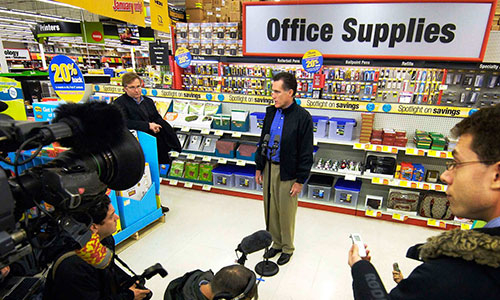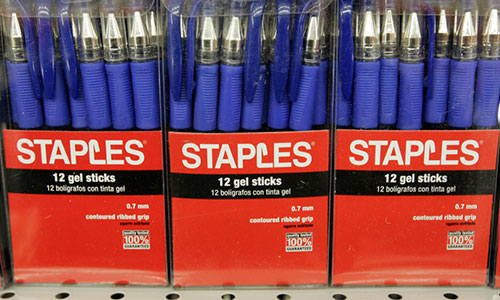PC LOAD LETTER
Office supply stores are places that nobody feels nostalgic about. Everyone should hate them. Here’s why.

Office superstores: really big, really fast
Generally, most household-name businesses have a good story to them, a situation where the successes and failures of the business hold broader lessons that translate to the public in general.
Even companies that people generally dislike, like Walmart, fall into this category.
The office-supply industry isn't really like that. In fact, it's sort of cut-and-dry. In the late 1980s, numerous entrepreneurs simultaneously figured out that businesspeople wanted a centralized spot to buy office supplies—a place that had cheaper prices and better hours than mom-and-pop shops.
Eventually, three of these brands broke through into the mainstream: Staples, which opened its first location in Massachusetts in May, 1986; Office Depot, which opened a Florida location in October, 1986; and OfficeMax, which got its start near Cleveland in April, 1988.
All three chains were launched by people who already had significant experience in the retail world, so they were less boot-strappy than most startups. Of the three, OfficeMax has perhaps the best story—a tale of tenacity, brought to life through numerous investments from Cleveland's Jewish community, with an initially smaller level of financial backing than its competitors—but all three basically exploded in size within just a few years, thanks to a combination of mergers, venture capital, and solid connections.
(In the case of Staples, it was Mitt Romney's first success story with Bain Capital. During the 2012 election, he commonly used it as an example of how he was a job creator.)
And separately, they built their big-box stores, growing so fast that the chains each became billion-dollar businesses within just a few years.
A store where you can buy pens in bulk isn't sexy, but it's sure a great way to make a lot of money.
601
The number of days between Office Depot opening its first store in Fort Lauderdale, Florida on October 9, 1986, and going public on the stock market on June 1, 1988. It took 1,092 days for Staples to do the same. OfficeMax was owned by Kmart for a few years and didn't go public until 1995.
Five outdated technology products that Office Depot and Staples still sell
- Dot-matrix printers: Remember these things? They haven't been commonly used in most office environments since the mid '90s, but a few businesses still use them for things like receipts and standardized forms, so Office Depot and Staples still have to sell them. They're not cheap—not by a long shot. A single dot-matrix printer these days goes for upward of $600, which is less than the cost of some color laser printers. But with the higher up-front cost and lower speed and quality comes something else: A cheaper long-term cost.
- Typewriters: Let's be fair—the typewriter still has a certain kind of appeal with scribes and creatives, but Office Depot and Staples don't sell those kind of typewriters. (You can find those here.) They sell Brother electric typewriters that probably hail from the late-'80s and don't really have much in the way of sex appeal. They probably don't even support Markdown! On the plus side, they don't cost as much as the dot-matrix printers.
- Floppy disks: It used to be that you could find a floppy disk by accident, but with USB drives and the cloud, they're about as common as newly released albums on 8-Track. But Office Depot still sells them in packs of 100, at a cost of $79.99 a pop. In comparison, you can buy 100 CDRs for a third of that price.
- Dial-up modems: Most people remember the tone of a dial-up modem—that 30-second handshake that blared brown noise waves into your ear—but haven't actually seen one of these devices since they ditched their AOL accounts. But in case you have a Juno account, you can still buy one!
- Old versions of software: Microsoft itself may no longer support Windows XP and in fact encourages its users to no longer purchase it, but the business world is slow and they haven't gotten the cue quite yet. Which is why you can still buy a copy of the 14-year-old operating system for $90.99, at a time when Microsoft is planning to offer Windows 10 as a free upgrade.
5,000
The number of sheets of paper in a 20-pound box of 8.5x11 paper, a product that Staples sells for around $50 a pop. The average U.S. office worker uses the equivalent of about two of these boxes each year, a number the Sierra Club estimates to be the equivalent of between one half-tree and one full tree.

Crazy about mergers
If you've been following the ins and outs of the office-supplies world in recent years (and admit it, you haven't), you may have heard that Office Depot bought OfficeMax in 2013, making a company worth around $17 billion in total worth that employs around 66,000 people. That's a lot.
But don't let the number fool you. It's a high-revenue, low-margin business, and those revenues are declining as office superstores find themselves having to compete with the likes of Amazon, Google, and the rest. (Oh, and the cloud. Why buy 40 pounds of paper per employee when you can keep those files on Dropbox?)
The nature of the companies being so large—needing both significant amounts of inventory and giant buildings to hold that inventory—means that the companies need to become as large as possible to make the scale worth it.
And that's why Staples has already tried to acquire Office Depot in the past, way back in 1996. In 1997, the Federal Trade Commission blocked the merger, saying that the two chains controlled so much of the office-supply market that they could singlehandedly raise the price of paper. But 2015 isn't 1997, and the chains suddenly have a lot more competition. So they're trying to do it agin.
Perhaps that's why this merger had an air of inevitability to it.
"And what’s to be excited about? These are two struggling chains, and they are struggling because the world around them—one they controlled so firmly back when the internet was still nascent—has completely shifted," The Wall Street Journal's Paul Vigna aptly put it on Wednesday.
These chains were created for a period of time that has now passed and now they're just there. We're stuck with them. They don't have massive historic value. They're just examples of what I like to think of as the proto-long-tail: They got us 80 percent of the way to getting us whatever we wanted when we wanted it, but they let companies like Amazon finish the job for them. And they're left holding the bags of pens.
That's why we don't feel nostalgia for these companies. They were built to be giant cash registers, and the strategy worked—for a while. Now the cash register rings a lot less, and they're just giant, having replaced all those office-supply stores that once filled main streets across the country.
If Office Depot merges into Staples and the brand name eventually gets dropped, not many people will miss it. It doesn't carry a wave of nostalgia, nor does it speak to a larger mission beyond selling lots of pens and rolodexes. In fact, it's likely that the only person who will miss it is Randy Bachman, the guy whose "Takin' Care of Business" has been the chain's theme song for decades.
But maybe he won't. Do you listen to that song and think of rulers instead of a workmanlike bar band like Bachman Turner Overdrive getting stuff done on a stage? If so, the office-supply trifecta has done its job.
:format(jpeg)/2017/08/tedium020515--1-.gif)
/2017/08/tedium020515--1-.gif)

/uploads/ernie_crop.jpg)